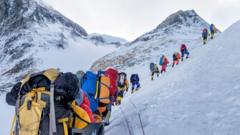Nepal has raised the price for climbing the iconic Mount Everest, marking the first significant increase in permit fees in almost a decade. Starting in September, climbers will be required to pay a fee of $15,000 (£12,180) during the peak climbing season, an increase of 36% from the longstanding fee of $11,000, according to government officials.
Permits for climbing during the off-peak months from September to November will see a similar increase, bringing the cost to $7,500, while fees for December to February will rise to $3,750. This fee hike will contribute to the growing revenue from mountaineering, which is a significant source of income for Nepal, illustrating the economic importance of mountain tourism which accounts for over 4% of the country’s GDP.
However, the decision has faced critiques from mountaineering experts who argue that the government permits too many climbers on Everest, with an annual issuance of around 300 permits. It's uncertain whether the new fees will deter the influx of climbers. Narayan Prasad Regmi, director general of the Department of Tourism, emphasized that it was essential to update the outdated royalty rates but did not clarify how the additional funds would be utilized.
British climber Kenton Cool, who has summited Everest 18 times, stated that the price hike was anticipated and noted it might not significantly affect most climbers’ decisions. He expressed hope that the increased revenue would be directed towards enhancing safety and managing the mountain's ecological issues effectively.
In response to ongoing concerns about overcrowding on Everest, Nepal's Supreme Court ordered the government in April 2024 to regulate the number of mountaineering permits issued, emphasizing the need to respect the mountain's carrying capacity.
Additionally, the Nepalese army has been engaged in clean-up operations on Everest, with efforts resulting in the collection of 119 tonnes of garbage, along with the recovery of human remains. Yet, disturbing estimates suggest that as many as 200 bodies may still remain on the mountain, highlighting the grim realities of overcrowding and safety in high-altitude climbing.
Nepal is renowned for hosting eight of the world's highest mountains, including Everest, making it a prime destination for climbers and adventure seekers across the globe. The recent hike in permit fees signals both an acknowledgment of the economic benefits of climbing tourism and a response to the growing need for sustainable management of its majestic peaks.
















